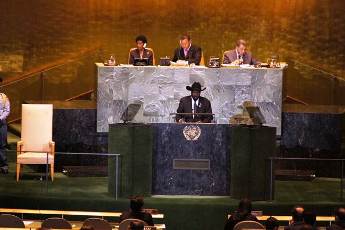South Sudan’s Kiir addresses UN, urges Khartoum to address conflicts
September 23, 2011 (NEW YORK) – South Sudan’s President Salva Kiir Mayardit on Friday delivered his maiden speech before the United Nations (UN), appealing for international assistance and resolutions to contentious issues with north Sudan.

Addressing for the first time representatives of the UN’s General Assembly in New York, Kiir conveyed his nation’s gratitude to the international parties which welcomed the new nation and helped to broker peace in Sudan.
“I would like to seize this rare opportunity, once again to salute many of you, who stood with us during our long struggle. We are indebted to many friends in this great hall without whose efforts, it would not have been easy for us to arrive where we are today. We owe a debt of gratitude to the IGAD countries, the Troika states, the friends and partners of IGAD, who waged peace for Sudan that culminated in the signing of the Comprehensive Peace Agreement in 2005.”
The South Sudanese leader went to underscore his country’s “dire need” for international assistance in order remedy the ramifications of war and lack of infrastructure.
Acknowledging his country’s “near total dependence” on oil resources, Kiir vowed to diversify his country’s economy and called on the international community to offer South Sudan with assistance on terms that will respect his nation’s “political and economic choices.”
“Oil is a non-renewable resource that will inevitably be depleted at some point in the future but we know that the land, water and human resources at our disposal will continue to be our country’s true inexhaustible fountain of wealth,” Kiir said.
Kiir also admitted no development can be achieved in the absence of peace and stability. Therefore he vowed to promote peace and stability with all South Sudan’s neighbours particularly the Sudan.
BLUE NILE AND SOUTH KORDOFAN
Earlier this month, the Sudanese government lodged a complaint to the UN Security Council accusing Juba government of supporting rebel groups in Sudan’s states of South Kordofan and Blue Nile and Darfur.
Alluding to this complaint, Kiir reaffirmed South Sudan’s commitment to refrain from interference in the domestic affairs of Sudan where his former comrades in arms waging war in the Blue Nile and Southern Kordofan against the central government in Khartoum.
“I wish to affirm that the Republic of South Sudan fully adheres to the principle of absolute respect for the sovereignty and territorial integrity of all states including the Republic of Sudan. Therefore the Republic of South Sudan hereby categorically restates that it has not and will not interfere in any domestic conflict situation in the Republic of Sudan,” he said.
However he defended the position of the SPLM-N when he called for a negotiated settlement to the conflict based of the Addis Ababa framework agreement signed on 28 June but later on rejected by president Bashir on 3 July.
Kiir further called on the Sudanese government to reinstate its commitment to the Addis Ababa agreement and negotiate with rebels Sudan People’s Liberation Movement North (SPLM-N) warning that the conflict in South Kordofan and Blue Nile, which border the south, could spread to affect South Sudan.
“We would like to emphasise in particular that the reinstatement by the government of Sudan of the recent Addis Ababa Framework Accord on the situation in Southern Kordofan State and political relations between the Government and the opposition, could go a long way in promoting the restoration of peace in the areas bordering South Sudan,” he said.
Kiir’s call on the Sudanese government to adhere to Addis Ababa deal is likely to draw the ire of Khartoum which maintains that the conflict in South Kordofan and Blue Nile is a strictly domestic affair.
BORDER DISPUTE
Turning to the front of post-independence issues between Sudan and South Sudan, Kiir called on Khartoum to expedite the border demarcation process and agree to the submission of the dispute over the ownership of borders areas to “international arbitration.”
He expressed hope that the governments of Sudan and South Sudan would soon reach a settlement to the dispute over the north-south border area of Abyei “in line with the relevant provisions of the CPA,” in reference to the Abyei Protocol of the CPA which stipulates a referendum on whether Abyei people want to join north or south Sudan.
Abyei referendum was supposed to be held simultaneously with that of South Sudan but the vote stalled due to disagreements between the north and the south over who can vote.
Kiir moved on to address economic disputes between Khartoum and Juba, vowing the latter’s willingness to continue serious negotiations with the Sudanese government in order to reach “mutually acceptable arrangements” for the use of Sudan’s oil export infrastructure.
Sudan and South Sudan were evenly splitting proceeds of the 500,000 barrels of oil produced daily from oilfields mainly belonging to the South since the signing of the CPA. After the south’s independence, the two sides have been negotiating arrangements to allow the south, which lacks pipelines and refineries, to use those of Khartoum to export its oil.
Turning to the domestic front, Kiir reiterated the south’s commitment to combat corruption and promote good governance.
“In terms of governance, we have moved to rectify some of the defects in our system by strengthening the pillars of good governance. A number of key Bills, notable among which is the ‘Public Financial Management Bill’, are now making their way steadily through the legislative process. The passage of such laws will help promote accountability and transparency and ultimately curb corruption and the unwarranted loss of public revenue,” he said.
(ST)
